It is a hard lesson to learn. Nevertheless, stealing other people’s written work is no less a crime than stealing their mobile phone, car or any other materialistic appendage you care to name. The more serious crime, I believe, is the ethical crime involved with plagiarising; the lack of thought that taking another person’s creative endeavour, publishing it as one’s own, gaining plaudits for it, might be wrong.See Yusof Martin's take on the affair. The picture of the extracts from the two books comes from his blog.
Monday, December 07, 2009
Adeline's Apology
Friday, July 10, 2009
It Was Only Cryptomnesia!
Unconscious plagiarism does exist, but writers who don't take proactive steps to avoid it are often either being lazy, or they have a diminished fear of being caught. Driving is a good model: it is easy enough to drift over the speed limit without being aware of it, but vigilant drivers can prevent the habit by forcing themselves to pay conscious attention to the problem. And just as not knowing one's speed won't save one from a ticket, the fact that unconscious plagiarism isn't outright fraud doesn't make "It was cryptomnesia!" much of an excuse. Unconscious plagiarism may not be a "felony," said Schneider, but it's still a journalistic "misdemeanor."Readers' responses to the article have been compiled here.
Wednesday, June 17, 2009
Well Phew!
Wonder if the trustees of Enid Blyton's estate will also be suing, after all jolly japes in a boarding school, magic or not, is so Mallory Towers?
Wednesday, June 10, 2009
1984 Revisited
 This week marks the 60th anniversary of one of the twentieth century's most important books - George Orwell's 1984.
This week marks the 60th anniversary of one of the twentieth century's most important books - George Orwell's 1984.In The Independent Andrew Johnson talks to other authors, including Robert Harris, Philip Pullman and Terry Pratchett, about it and about other reads that are particularly important to them.
(What are your memories of it? It's one of the books I've revisited several times since I first read it when I was at school in the '70's.)
Paul Owen on The Guardian blog points out that the plot was ... erm borrowed ... from Yevgeny Zamyatin's We, published in English in 1924, and which Orwell himself reviewed.
But maybe it's all right in the end. Johnson concludes :
... it is extremely doubtful Zamyatin's book would have come to fill the unique place Orwell's work now occupies. Nineteen Eighty-Four is an almanac of all the political ideas no "right-thinking" person would ever want their government to countenance, and the word Orwellian has come to signify a badge of shame intended to shut down any movement in that direction – with an imperfect record of success.
Tuesday, January 15, 2008
Not Just a Pretty Face
Well, you be the judge:
This is a poem called Cake by Roger McGough:
i wanted one lifeAnd this is Hudson's Cokolat:
you wanted another
we couldn't have our cake
so we ate each other.
Saya mahu satu kehidupan,A direct translation and not attributed to McGough.
Kamu mahu sesuatu yang lain,
Kita tidak dapat makan kek coklat,
Jadi kita makan sesama diri.
Just in case anyone is unclear on the concept, plagiarism is not a very nice thing to do to another writer, and I believe it counts even when translation is involved.
Postscript:
Here is a link to the site where Ms. Hudson and her publishers should have applied for rights to reproduce one of McGough's poems.
Postscript 2:
Nina Shah's post on the matter made me laugh, suggesting that N.H's translations sound like they've been done via babelfish and she suggests:
Someone should make a makro, with a pic of th DBP Kamus Dwibahasa with the caption: ICANHAZPLAJIARIZMNAO?I'd like that on a t-shirt!
Other bloggers who have picked the story up include Chech and Da Cookie, while Liyana inspired me to this.
Saturday, June 09, 2007
Political Poet
Works minister Samy Vellu gave the couple a poem which appears to have been ... er ... borrowed from other sources according to a letter on the Malaysiakini website*. I'm sure it's all a misunderstanding as the politician is an accomplished poet who has penned some stirring words of tribute for the PM before.
Postscript:
Looks like MP Chow Kon Yeow was the first to spot the similarity. Dangerous thing Google!
(*Another story via Amir who is my champion story-spotter at the moment!)
Thursday, February 22, 2007
The Satisfaction of Finishing a Book
KayKay forwarded a really nice piece from John Connolly's blog about the satisfaction of finishing a book. His thoughts after finishing and enjoying Wilbur Smith's River God:
I ... felt a degree of satisfaction as I closed the book and put it to one side. There, I thought: another book read, and a lengthy one at that. For a moment, I was one step closer to reading every book in my house, albeit a step forwards that would soon be nullified. River God will probably go to my local Oxfam shop, and there is now a space where it once sat on my bookshelves, a space that can be occupied by a new book as soon as I find the time to amble into one of my native city's many bookstores.
Alas, it is a satisfaction I'm very far from feeling this week. I've never been so part way through so many books.
Believe it or not I'm still reading my first book from the TBR Challenge Martin Amis' Money, but I'm well past half way which is not bad.
I bought the book because I thought I oughta. Had heard stories of Amis being obnoxious and his protagonist is obsessed with ... yes, filthy lucre, and you can't get more crass than that.
Didn't expect to be laughing myself stupid so often, delighting in the bad-boy voice (Amir Hafizi has to read this! making a mental note to pass him my scrunched up pizza-decorated copy when I buy a shiny new one), the dialogue, and the craft of every sentence.
The book is set during the Summer of the Charles and Di wedding and the riots which swept the country. The novel captures the early 80's and Thatcher's Britain so well.
It isn't my first Amis, because I read Time's Arrow years back. That's a bit of clever writing, a whole novel told in reverse chronological order from the protagonist's death to his birth. (Try imagining eating backwards for e.g. ... but that's not the worst). Just like a movie being rewound.
I've got to read The Black Dahlia by James Ellroy because Kaykay said so.
Okay then, it's our book club choice and the meeting is next week. Crime fiction so isn't my thing. And this is very much a sweat soaked testosterone drenched bloke book. But it is very well written and I'm not a quitter. So.
I'm also trying to read Yang-May Ooi's Mind Game before Saturday and the Breakfast for Litbloggers thing at MPH and then the readings at Seksan's.
Thrillers aren't my thing either. When I was in Nigeria I overdosed on them because they were the only books available, thanks to my neighbour.
Anyway, am finding Yang-May's novel (which I managed to borrow from my friend Soo Choon) an intriguing read. I appreciate the contemporary Malaysian setting, and find the Asian Values Alliance, bent on world domination, most sinister. And I like that its an unashamedly lesbian love-story!
Have started reading Camilla Gibbs Sweetness in the Belly as I will be interviewing the author when she comes for the KL Literary Festival at the end of March so this is homework, but nice homework as I am enjoying its African setting.
So a lot of books hanging halfway ...
Oh yes, I did finish one book, Richard Posners Little Book of Plagiarism. A legal mind tackles who did and who did not plagiarise in literary history. (Shakespeare gets off the hook you'll be pleased to know!) and just what constitutes plagiarism in the legal context. It's an extremely readable guide, fascinating for litbuffs and invaluable for academics.
One little quote I'll leave you with:
The reader has to care about being deceived about authorial identity in order for deceit to cross the line to fraud and thus constitute plagiarism.
That's right. The ball is in the reader's court.
Friday, January 19, 2007
Malaysian Bloggers Sued
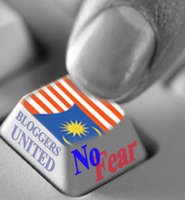 Am deeply shocked by the news that Malaysian Bloggers Jeff Ooi and Rocky aka Ahirudin Attan are to be sued by the New Straits Times over their whistle-blowing re. former editor Brendan Pereira's (alleged - let's play safe, no matter what one really feels) plagiarism of a Mitch Albom article.
Am deeply shocked by the news that Malaysian Bloggers Jeff Ooi and Rocky aka Ahirudin Attan are to be sued by the New Straits Times over their whistle-blowing re. former editor Brendan Pereira's (alleged - let's play safe, no matter what one really feels) plagiarism of a Mitch Albom article.All I intend to say about the case here is that I feel that it is really sad that the whole issue could not have been handled without gun-slingers needing to turn up at high noon. But then it really is, as BBC correspondent Jonathan Kent said earlier, a case of new vs. old media. There's a subtext, and it's one all bloggers should tune into.
Lim Kit Siang agrees:
As these are the first two cases of Malaysian bloggers being sued for defamation, it will have far-reaching consequences for the healthy, mature and democratic growth for free speech and expression, not only on the Internet but in the country as a whole.It's not often I plug a law book on this blog but might I suggest that all parties purchase and read immediately Richard A. Posner's newly published The Little Book of Plagiarism which the New York Times describes as "a useful and remarkably concise overview of the subject". The book sets out to address such questions as:
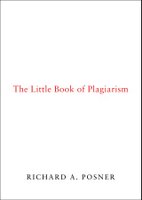
... what exactly is plagiarism? How has the meaning of this notoriously ambiguous term changed over time as a consequence of historical and cultural transformations? Is the practice on the rise, or just more easily detectable by technological advances? How does the current market for expressive goods inform our own understanding of plagiarism? Is there really such a thing as “cryptomnesia,” the unconscious, unintentional appropriation of another’s work? What are the mysterious motives and curious excuses of plagiarists?and most importantly in this case:
What forms of punishment and absolution does this “sin” elicit?
Also go read Rocky's blog (and he's looking for a lawyer to represent him).
Sunday, December 10, 2006
Pynchon On Pinchin'
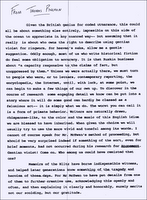 The fallout from the Ian McEwan did-he-or-didn't-he
The fallout from the Ian McEwan did-he-or-didn't-he-plagiarise-and-anyway-does-it-matter debate continues.
The Independent reports that: ...
Lucilla Andrews' 30-year-old book No Time for Romance, previously on sale on Amazon for $12.50, has jumped to $2,185.71 (£1,100).Novelists from the usually reclusive Thomas Pynchon to Zadie Smith have leapt passionately to McEwan's defense, and yesterdays' Times lists their statements. The most succinct is Martin Amis:
Historical fiction – as opposed to historical fantasy – cannot be written without help from historical sources. The novelist acknowledges that help, with gratitude, and the world moves on.while the snippiest is Margaret Atwood who offers the lovely expression "flea-hitching" to posterity. ('Scuse me while I scratch.)
Meanwhile Ben McIntire finds himself "in bed with McEwan" and quite enjoying it.
Natasha Alden, the PhD student whose research started the furor explains the purpose of her research and the questions it has thrown up about the right and proper way of using other people's writing. She notes:
It is very difficult for anyone not to be influenced by vivid and well written words and not to replicate them, consciously or unconsciously. The novel is a hybrid form – based in reality, but making something new; this is particularly apparent in historical novels. Historical details, as McEwan has said, bring life and vigour to fiction. The imagination is crucial, but research brings truth. So what is the novelists’ responsibility to their sources? How can a contemporary novel speak to the past, or speak out of it ...?(I do hope Ms. Alden eventually turns her thesis into a book. I'd want to buy it.)
Of all the musings on the topic, I most enjoyed Robert McCrum's article in last Sunday's Observer. (Shakespeare a pickpocket?)
So the jury has delivered its judgment. It is a much comforting one for all fictionators. And the whole business has created an entertaining little side-show for the last few days.
Perhaps now poor Mr. McEwan can go back to his work.
(Above: Pynchon's letter pinchoned from McEwan's website. All in the interest of research, you understand. Click and click to read.)
Saturday, December 02, 2006
A Little Literary Lifting
 The boundary between "legitimate use" and plagiarism is at times a little blurry, and last weekend Ian McEwan found himself accused of lifting the words of another writer in his 2001 Booker nominated novel Atonement.
The boundary between "legitimate use" and plagiarism is at times a little blurry, and last weekend Ian McEwan found himself accused of lifting the words of another writer in his 2001 Booker nominated novel Atonement.This is how it happened. A PhD student at Oxford University was researching her thesis on war fiction. She discovered that McEwan had borrowed extensively from No Time For Romance, a memoir by Lucilla Andrews which describes her time as a nurse at St Thomas’ Hospital in London during the Second World War.
 The student contacted Ms Andrews' agent Vanessa Holt, who said that she had found McEwan’s behaviour discourteous and disappointing, and let her client know. Andrews, the grand dame of romantic hospital fiction, was amused rather than angry about the borrowing, but planned to highlight it in an acceptance speech she was scheduled to give for a lifetime achievement award by the Romantic Novelists' Association at a lunch to be held at the Scottish parliament. Sadly, she passed away before she could have her fun at McEwan's expense.
The student contacted Ms Andrews' agent Vanessa Holt, who said that she had found McEwan’s behaviour discourteous and disappointing, and let her client know. Andrews, the grand dame of romantic hospital fiction, was amused rather than angry about the borrowing, but planned to highlight it in an acceptance speech she was scheduled to give for a lifetime achievement award by the Romantic Novelists' Association at a lunch to be held at the Scottish parliament. Sadly, she passed away before she could have her fun at McEwan's expense.But then the whole story came to light. Britain's Mail on Sunday picked it up, and raised the spectre of plagiarism as they invited readers to:
SPOT THE DIFFERENCEThe debate then bounced around on the pages of other newspapers, and McEwan hit back in the Times and said:
Excerpt from Atonement, by Ian McEwan...
"In the way of medical treatments, she had already dabbed gentian violet on ringworm, aquaflavine emulsion on a cut, and painted lead lotion on a bruise. But mostly she was a maid."
Excerpt from No Time For Romance by Lucilla Andrews...
"Our 'nursing' seldom involved more than dabbing gentian violet on ringworm, aquaflavine emulsion on cuts and scratches, lead lotion on bruises and sprains."
... his conscience was “absolutely clear”, and that it was almost impossible for a writer not to face accusations of copying at some point. He described Ms Andrews’ memoir, entitled No Time For Romance, and published in 1977, as a unique historical document that had helped him to recreate the atmosphere of a wartime hospital, but denied that Ms Andrews was the basis for one of his main characters. ... “When you write a historical novel you do depend on other writers. I have spoken about Lucilla Andrews countless times from a public plaftform. It has always been a very open matter.”In another article in the Guardian he talked more about his debt to Ms Andrews:
I know well from researching Saturday, a novel about a neurosurgeon, that patient traumas, medical procedures, hospital routines or details of training demand the strictest factual accuracy. When all these elements are 60 years in the past, the quest for truth becomes all the more difficult and important.And he pointed out that he had acknowledged her in the author's note to Atonement.
It was extraordinary, then, to find in the Wellcome Trust medical library, in Oxford, No Time for Romance, the autobiography of Lucilla Andrews, a well-known writer of hospital romances - my mother used to read her novels with great pleasure. Contained within this book was a factual account of the rigours of Nightingale training, the daily routines and crucially, of the arrival of wounded soldiers from the Dunkirk evacuation and their treatment. As far as I know, no other such factual account exists. Andrews even recounted an episode that paralleled my father's experience of being told off for swearing.
What Andrews described was not an imaginary world - it was not a fiction. It was the world of a shared reality, of those War Museum letters and of my father's prolonged hospital stay. Within the pages of a conventional life story, she created an important and unique historical document. With painstaking accuracy, so it seemed to me, she rendered in the form of superb reportage, an experience of the war that has been almost entirely neglected, and which I too wanted to bring to life through the eyes of my heroine. As with the Dunkirk section, I drew on the scenes she described. Again, it was important to me that these events actually occurred. For certain long-outdated medical practices, she was my sole source and I have always been grateful to her.
John Mullan on the Guardian blog sees it all as a bit of a non-issue:
Novelists have always borrowed from historical sources ...he says, naming Shakespeare and Sir Walter Scott as borrowers of other people's material. And reminding us that:
Literary critics have long embraced TS Eliot's dictum that mediocre writers borrow, while great writers steal.Great or not, this won't be the first time that McEwan has stood accused. As D.J. Taylor points out in this fascinating account of literary borrowing in the Independent:
In the late 1970s several critics dutifully observed that Ian McEwan's The Cement Garden, in which a gang of suburban children conceal their mother's corpse, seemed to derive from Julian Gloag's Our Mother's House, which McEwan claimed never to have read.More on the story Ian McEwan's website.
Related Posts:
Index: Rogues Gallery of Fakers and Plagiarisers
On Ian McEwan:
His Saturday, My Sunday (4/9/05)
Hello, Would You like a Free Book? (20/9/05)
Friday, November 03, 2006
Karma for Plagiarists?
 I honestly wasn't going to blog anymore about that plagiarism case, but I found this wonderful example of what-goes-around-comes- around-ness. Someone called Tiban had posted this link on Jeff Ooi's blog to an another article about plagiarism:
I honestly wasn't going to blog anymore about that plagiarism case, but I found this wonderful example of what-goes-around-comes- around-ness. Someone called Tiban had posted this link on Jeff Ooi's blog to an another article about plagiarism:And the culprit this time - wait for it - is no other than plagiarised himself!:
Detroit Free Press columnist Mitch Albom lifted quotes from other publications without attribution and in some stories quotes appeared to be slightly changed from how they appeared elsewhere, according to a Free Press investigation of their embattled star writer.And he also apparently fabricated his facts!
Incidentally, just look at how the newspaper apologises for the plagiarism, and takes responsibilty for the actions of its journalist, emphasising that it has a code of ethics to maintain. Isn't that great!
At a time when public trust in the media is low, credibility is a treasured commodity.Quite.
(Pic nicked, though not plagiarised, from the Age)
Thursday, November 02, 2006
Jeffooied!
 If you hadn't noticed I got "jeffooied" this morning which resulted in this blog getting several hundred more visitors than usual. I meanwhile was trying not to keep looking at my blog or my sitemeter because I needed to get some work done, especially as a bad throat infection this week has meant I'm behind with all the "have to" stuff. (Sorry, Renee.)
If you hadn't noticed I got "jeffooied" this morning which resulted in this blog getting several hundred more visitors than usual. I meanwhile was trying not to keep looking at my blog or my sitemeter because I needed to get some work done, especially as a bad throat infection this week has meant I'm behind with all the "have to" stuff. (Sorry, Renee.)I've been drawn once more into the fray to blog and vent a little righteous indignation about plagiarism. And as usual when things go weird on me, it's all Amir Hafizi's fault. (See here and here if you don't believe me.)
See, there I was late last night thinking I'd just have a quick glance at his post because I needed a laugh. And then his post led me to Rocky's blog where I found a discussion in progress about NST's Brendan Pereira's plagiarism of an article by Mitch Albom, which had been exposed by Rocky and Jeff.
Plagiarism interests me ... a lot (as readers of this blog will know), and I couldn't resist jumping in with my tuppence worth (a philosophical meandering about where the border between plagiarism and satire is drawn) which then got picked up by Jeff in a post this morning somewhat edited (though he left in the ouchy spelling).
Brendan Pereira's plagiarism was clear cut and the blogging community has pronounced his guilt. Still, had Brendan acknowledged the source of the framework he pegged his article too, I think he could have legitimately borrowed the form. It's the non-attribution that makes it plagiarism.
I wrote:
...if the article he had taken had been known to the wider malaysian public and if he had used it as a basis for a humourous or ironic piece which built in some sense on the original article, that would not have been plagiarism.(Have possibly been proofreading too many boring legal documents, to write like this!) Anyway, Jeff quoted me and I got a mini-break of fame.
Brendan Pereira has now been replaced as the Group Editor of the NST. Jonathan Kent of the BBC picked up the story which he saw as
... a clash between the old and new media about the basic standards of the profession.As indeed it is. And bloggers appear to have the higher moral ground. Let's see what happens in the NST.
The outing of plagiarists by bloggers is not just happening here. Consider the case of Anne Coulter:
Universal Press Syndicate investigated the plagiarism allegations and concluded that "minimal matching text is not plagiarism" stating also that "Universal Press Syndicate is confident in the ability of Ms.Coulter, an attorney and frequent media target, to know when to make attribution and when not to ("Sorry harpies--syndicator sees no Coulter plagiarism", Chicago Tribune)I leave you with the following happy thought - also from the Famous Plagiarists website:
What is a Plagiarist ?
A Plagiarist sucks the lifeblood right out of a text for his own selfish nourishment. He cares not that the life of the Author is forfeited through his bloodthirsty textual savagery-ravagery and asserts blasphemously that a text has somehow attained “the right to kill, to become the murderer of its author”. [2] The Plagiarist siphons off the life giving crimson fluid as ink for his own pen, without a thought for either the Author, or for the Reader. And he splashes this stolen red ink freely on the pages of his own textual plagiarations. To the Plagiarist, the words are there for the taking. After all, whose words are they really anyway? Who can rightfully claim ownership of the discourse that characterizes human communication? The Plagiarist justifies his plagiarisms through pseudo-philosophizations and self-justifications as he happily helps himself to your blood, my blood—anybody’s blood, as long as that red ink remains life-givingly fluid, un-encrusted, as yet un-congealed. A Plagiarist is a textual vampire . . .
(Nice pic of Jeff Ooi pinched from Oon Yeoh's website)
Further Thoughts:
Has anyone yet asked Mitch Albom how he feels about his work being lifted? Now that would be interesting!
Something no-one seems to be talking about ... there are actually degrees of plagiarism. Take a look at this table of threat levels and think about where you would put Brendan Pereira in this case.
Has anyone considered that Brendan Pereira might be a cryptonesiac?
Latest news on Jeff''s site this morning, the NST is threatening to sue the BBC!
And goodness, here's a lesson in just how far a comment left casually on a blog and not particualrly well formulated can travel - I'm quoted in Singapore's free newspaper Today Online.
Related Posts:
Index: A Rogues Gallery of Fakers and Plagiarisers
And also about plagiarism in the Malaysian press:
Cut and Paste Review - The Murder of Macbeth (15/9/05)
Plagiariased Reviews - She's at it Again (17/9/05)
Tuesday, June 13, 2006
Dan Brown's Trial by Magazine
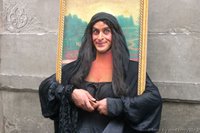 Thought the plagiarism charges against Dan Brown were now over and done with? Now, it seems, he faces trial by magazine.
Thought the plagiarism charges against Dan Brown were now over and done with? Now, it seems, he faces trial by magazine.In the July issue of Vanity Fair, Seth Mnookin raises new questions about the originality of The Da Vinci Code and takes up the cause of Lewis Purdue who lost a court case against Brown in the US courts earlier this year. Purdue claims that Brown's book was a rip-off of his own novel, Daughter of God. (I hadn't realised before this that the publisher Random house was suing Purdue, and not the other way around.)
According to The Age, The Vanity Fair article lists several points of similarity between the two books, among them:
... the key to the mystery is hidden in artworks, there are Swiss bank accounts, and there is a shadowy group in the Catholic Church. In Perdue's book, an art collector is murdered to protect the secret. In Brown's book, a curator is murdered to keep the secret.
When Ed Condren, an English professor at UCLA, performed a textual analysis of Perdue's work and The Da Vinci Code for Vanity Fair, he concluded:
I didn't think there was any question the one borrowed from the other. Daughter of God and The Da Vinci Code employ identical narrative strategies. These novels share the same background story, not only in the personages and events they refer to, but more important, in the identical ways they distort these historical events to support their nearly identical stories.
John Olsson, the director of Britain's Forensic Linguistics Institute, says of the book:
This is the most blatant example of in-your-face plagiarism I've ever seen. It just goes on and on. There are literally hundreds of parallels.
And it also looks as if Brown lifted an exact passage from Leonardo's Lost Robot, written by academic and robotic expert, Mark Rosheim.
There's also the suggestion that Brown's wife, Blythe, who did much of her husband's research may have sent Purdue mysterious e-mails under the name Ahamedd Saaddodeen. Quite what these e-mails were about I haven't been able to find out online.
But as they say, the plot thickens.
*Picture nicked from Florence Photo Gallery.
Related Posts:
Index: Rogues Gallery of Fakers and Plagiarisers
Wednesday, May 10, 2006
Steal Someone Else's Words!
Thanks, Walker, for sending me news of this great writing competition for plagiarists.
The rules are fun:
Your final piece is limited to 750 of other peoples’ words; none of those words may be your own.
All material must be cited (author, work, page number). This is the only part where you have to be honest; unlike professional publishers, we’re actually going to check.
You must plagiarize from a minimum of five different books by as many authors as you wish. The only demand we make is that those books were published at some point, somewhere.
You must lift only phrases, whole sentences, or passages. No single wordcitations allowed.
Sunday, May 07, 2006
More Kaavya Fallout
Just when you thought it was safe to come out of the water ...
Kaavya Vishvanathan was back in the news this week when it was revealed that her plagiarism extended (can you believe?) to other texts as well.
In the age of the Internet, literary exegesis (whether driven by scandal or not) is no longer undertaken solely by pale critics or plodding lawyers speaking only to each other, but by a global hive, humming everywhere at once, and linked to the wiki. And if you are big enough to matter (as any writer would hope to be), one misstep, one mistake, can incite a horde of analysts, each with a global publishing medium in the living room and, it sometimes seems, limitless amounts of time.Hey, friends, we're part of that! (Limitless amounts of time, though? I wish I could kick the addiction.)
Principle whistle blower was the Sepia Mutiny blog (which I intitially discovered thanks to Sharanya: the first post on the scandal is here .)
Kaavya seems also to have lifted from Sopia Kinsella's Can you Keep A Secret, from Meg Cabot's The Princess Diaries, and from Tanuja Desai Hidier’s Born Confused and from Salman Rushdie's Haroun and the Sea of Stories.
But all may not be lost for Kaavya, as some wag notes on the blog - since many Indians don't believe in intellectual property, Viswanathan could have a tremendous career writing for Bollywood!
An interesting case of cryptonesia came to light in the wake of KaavyaGate when it was revealed that Helen Keller created her own publishing scandal when she published a story called The Frost King. As Keller tells it in her autobigraphy:
Mr. Anagnos was delighted with 'The Frost King,' and published it in one of the Perkins Institution reports. This was the pinnacle of my happiness, from which I was in a little while dashed to earth. I had been in Boston only a short time when it was discovered that a story similar to 'The Frost King,' called 'The Frost Fairies' by Miss Margaret T. Canby, had appeared before I was born in a book called 'Birdie and His Friends.' The two stories were so much alike in thought and language that it was evident Miss Canby's story had been read to me, and that mine was — a plagiarism."
(Thanks McLee for dropping this story into the comments of my previous post on the case.)
Sunday, April 30, 2006
Kaavya and Carver: Cryptonesiacs?
That certainly happened the other day when I wrote about Kaavya Viswanathan's plagiarism and if you have the time, do go and pick up some of the leads.
Dear old Anon left an intriguing note about an interesting article in IHT which highlighted that the author actually worked with a book packager to come up with the storyline. I tracked down the article to the New York Times, and intriguing reading it makes too. Like Anon, I had never heard of a book packager before and my eyes are opened. Tom Tomorrow tackles the same subject on his blog (thanks so much Swifty, for this link) and smells a rat:
Obviously I don’t know what’s going on here, but I’d be willing to bet some modest sum (my own advances falling rather short of the half million mark) that there’s more to this story than is being reported so far.Also worth checking out is the story from the archives of salon.com that Sufian mentioned: why is Raymond Carver's most famous short-story Cathedral so similar to a D.H. Lawrence: The Blind Man? Of course, there can be no question of a great writer like Carver getting up to Kaavya-like shenanigans ... can there?
Meanwhile, copies of Kaayva's book are stacked high in Times in Bangsar Shopping complex. Since the book is apparently being recalled, you might want to whiz over there and bag one, because it's bound to have rarity value later on. (One of the biggest regrets of my life is that I didn't buy the locally produced Gulf War board game back in 1991. Just think how much that would be worth now!)
Just in case you aren't sure what a cryptonesiac is, check it out here.
Thursday, April 27, 2006
How a Plagiarist Got Discovered
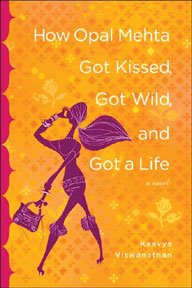 Another plagiarist uncovered, it seems!
Another plagiarist uncovered, it seems!Read the story in the Malay Mail yesterday (for some strange reason the MM seems to be suddenly quite good about picking up quirky book news.)
Harvard undergraduate Kaavya Viswanathan scooped a publishing deal worth $500,000 for her first novel and another book. She now stands accused of plagiarisng parts of How Opal Mehta Got Kissed, Got Wild and Got a Life from two novels by Megan McCafferty, Sloppy Firsts and Second Helpings. Both books tell of a young woman from New Jersey trying to get into an Ivy League college. The New York Times reports that there are at least 29 (!) passages that are strikingly similar. Viswanathan has issued an apology.
Jane Sunshine e-mailed me this morning to go take a look at Khitabkhana, and there's links to more gossip about the case there.
Saturday, April 08, 2006
Da Vinci Codswallop
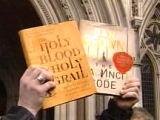 Yes, as =] so succinctly put it:
Yes, as =] so succinctly put it:Dan Brown 1, Baigent and Leigh 0
Across the Atlantic though, Lewis Purdue is fighting on, and I wish him luck.
The judge ruled that novelists "remain free to draw in ideas and historical research". I'm glad of that, though I do not feel like popping the cork of a bottle of champagne to celebrate Brown's victory. We know he took the easy way out, swiped fascinating material and churned out (and this is really what can't forgive him for) a third-rate novel that all the marginal readers of the world applaud as if it were in itself some kind of holy grail.
And he didn't even do his own research as it turns out ... it was his wife who downloaded stuff from the internet for him (often without the sources being clearly noted).
Don't know about you but I have no respect for writers who don't get their own hands dirty with digging up the facts ...
Related post:
Holy Plagiarised Madonnas (1/3/06)
Friday, March 17, 2006
Severe Warning - Plagiarists Around!
 My post on the Dan Brown case the other date sparked plenty of discussion about what constitutes plagiarism and your comments raised some very important questions.
My post on the Dan Brown case the other date sparked plenty of discussion about what constitutes plagiarism and your comments raised some very important questions.I've since found an excellent website about plagiarism of all kinds. John Lesko's Famous Plagiarists blends careful academic argument with humour. It's a topic he clearly feels passionate about:
Plagiarism is an offense against authorship and originality, and we are criminal accomplices in such offenses if we attempt to justify a plagiarist or ameliorate the consequences resulting from such odious behavior.
Strong words, and there's plenty more. He lists some of the most famous literary plagiarists and kleptomaniacal popular writers along with their threat rating (as in the picture I plagi- ... er ... borrowed above).
There are writers we might expect to be there like Mr. Navahoax himself - Tim Barrus and Dan Brown. (The former gets a red rating , the latter only blue.)
But there are surprises - TS Eliot (rated yellow), Jack London (yellow), Stephen King (green), J.K. Rowling (blue) ...
... and the grandaddy of English Literature himself (blue -guarded risk). Shame on you, Billy!
Tuesday, March 07, 2006
Accuracy and Copyright
Meanwhile, the writing and publishing world hold their breaths while the Random House authors slug it out in the High Court. David Barrett, an author of books on religion and a journalist who is reporting on the case told The Age:
"The implications are massive. ... If Baigent and Leigh win — and I think they do have a strong case — then writers are going to have to be a lot more careful."Apparently, a victory for the plaintiffs would "overturn the accepted rules of writing and publishing" and novelists such as Michael Crichton and Julian Barnes, who have written novels based on historical events, "could be exposed".
Now I thoroughly enjoyed Barnes' Arthur and George and had not questioned the validity of the historical fact until I read Walker's take on the book the other day. Let me now eat my words about it being "meticulously researched"!
(How strange though that if an author sets a novel in Malaysia and gets the facts wrong or chooses to ignore them, I'm immediately screeching with righteous indigination! There's just no consistency in me!)